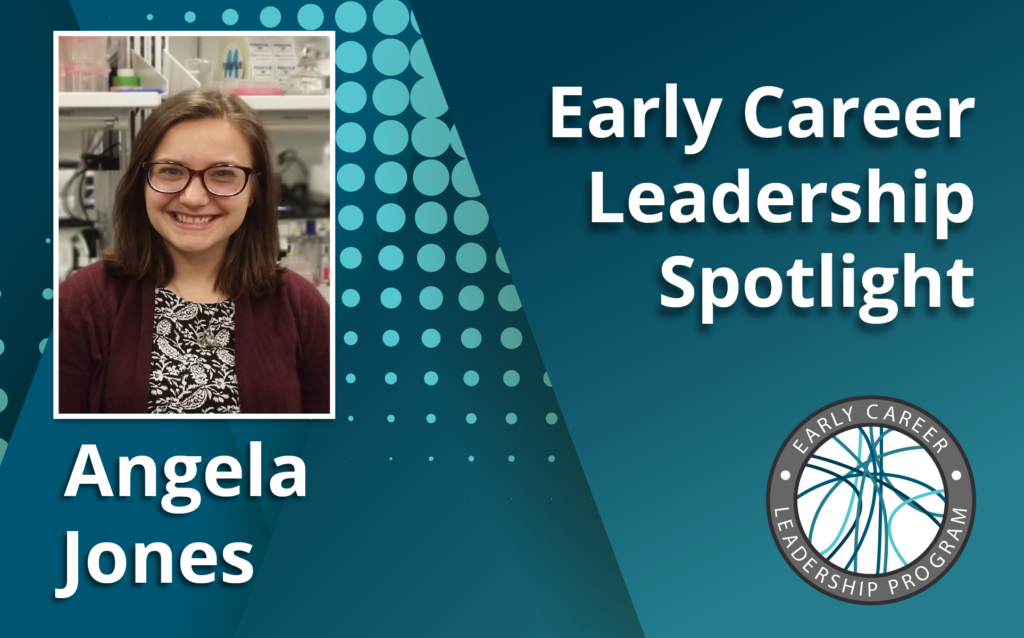We’re taking time to get to know the members of the GSA’s Early Career Scientist Committees. Join us to learn more about our early career scientist advocates.
Angela Jones
Communication & Outreach
Duke University
Research Interest:
I am interested in how genetic differences between humans affect our response to diseases. My research specifically looks at the largest sources of genetic variation in people: the sex chromosomes. Mammals usually have either two X chromosomes or one X and one Y chromosome, aligning to the biological sex definitions of female and male, respectively. Because of this massive difference in the genetic background of females and males, there are widespread effects across the genome in expression and function of genes. These differences are reflected in human health, where sex differences in the incidence, prevalence, severity, and treatment response in disease run rampant. For example, females are more likely to develop autoimmune disease but show greater resistance to most infectious agents than males. Sex disparities are also clear across cancers—with kidney, liver, skin, and laryngeal cancers displaying a male bias, while breast and thyroid cancers are more common in females.
Despite these widespread differences, little is known how functional variation in the genome affects sex differences in human disease. Previous attempts to link gene expression differences to single nucleotide changes or small insertions/deletions through sex-biased expression quantitative trait loci (sb-eQTL) discovery have reported few significant associations, with little replication across independent datasets. Recently, I have developed a novel approach to discover sb-eQTL across the human genome. Through single-cell RNA-sequencing of nearly 500 human cell lines from worldwide populations, I can identify thousands of regions in the genome where biological sex is linked to differences in gene expression. In addition, hundreds of these sb-eQTL are significantly associated with human disease phenotypes in the NHGRI-GWAS catalog. By investigating sex differences across the genome, we can discover genomic variants that affect sex-biased expression and that are linked with human disease, building a previously unknown connection between genotype and phenotype.
As a PhD-trained scientist, you have many career options. What interests you the most?
As I’ve progressed in my research career, I am consistently drawn to using large-scale genomics to puzzle out biological mysteries. We are currently at a pivotal stage in genetics and genomics where we can create massive amounts of data, but we lack the analytical and computational methods to effectively utilize these data. In addition, there is a critical need for diverse and inclusive large-scale genomic studies in order to better understand how human genetic diversity can affect human health outcomes. Because of my interest in these genomic problems, I have pursued training in computational skills and discovered that I enjoy working at the computer more than at the bench. I hope to continue expanding my computational genetics skills and work in a collaborative research group in either industry or government to answer complex questions in human health with data-driven genomic approaches.
In addition to your research, how do you want to advance the scientific enterprise?
Throughout my various research experiences, I have realized that dissemination of science to the broader public is critical. While academic articles and conference presentations foster vital connections with fellow scientists, I have always been drawn to teaching and mentoring my local community through scientific outreach. To this end, I have continually sought out or created my own opportunities to share my passion for science with others. Recent events have illustrated the crucial role of clear scientific communication, and the genetics community is poised to serve the public in this manner.
As a graduate student, I am focused on service and STEM outreach. From creating workshops that help elementary school to high school students learn about genetics to hosting webinars that de-mystify the graduate school application process, I strive to educate others about how science really happens. This unique combination of outreach opportunities has given me an inside look at STEM education and outreach and has shown me the need for clear, interactive, and informative dissemination of primary research to the broader public.
As a leader within the Genetics Society of America, what do you hope to accomplish?
My goals for this leadership role include working with the genetics community to foster communication to the broader public. In addition, I hope to facilitate opportunities for my scientific peers to pursue their own outreach goals and improve their science communication skills. An early career leadership role with the Genetics Society of America provides an extremely unique opportunity to develop and implement community-based outreach with scientific peers. As a member of the Communication & Outreach Subcommittee, I am able to work with graduate students, post-docs, and faculty mentors to hone my science communication skills while reaching a broader audience about the fascinating discoveries happening every day in genetics and genomics.
Previous Leadership Experience:
Co-President, Society of Duke Fellows, Duke University, 2022–present
Co-President, Duke Outreach in Genetics and Genomics, Duke University, 2020–present
Amgen Scholars Program Student Director, Duke University, 2023
Co-Chair, UPGG Curriculum Committee, Duke University, 2021–2023
Co-Chair, UPGG Recruitment Committee, Duke University, 2021–2023




